2017 activity report
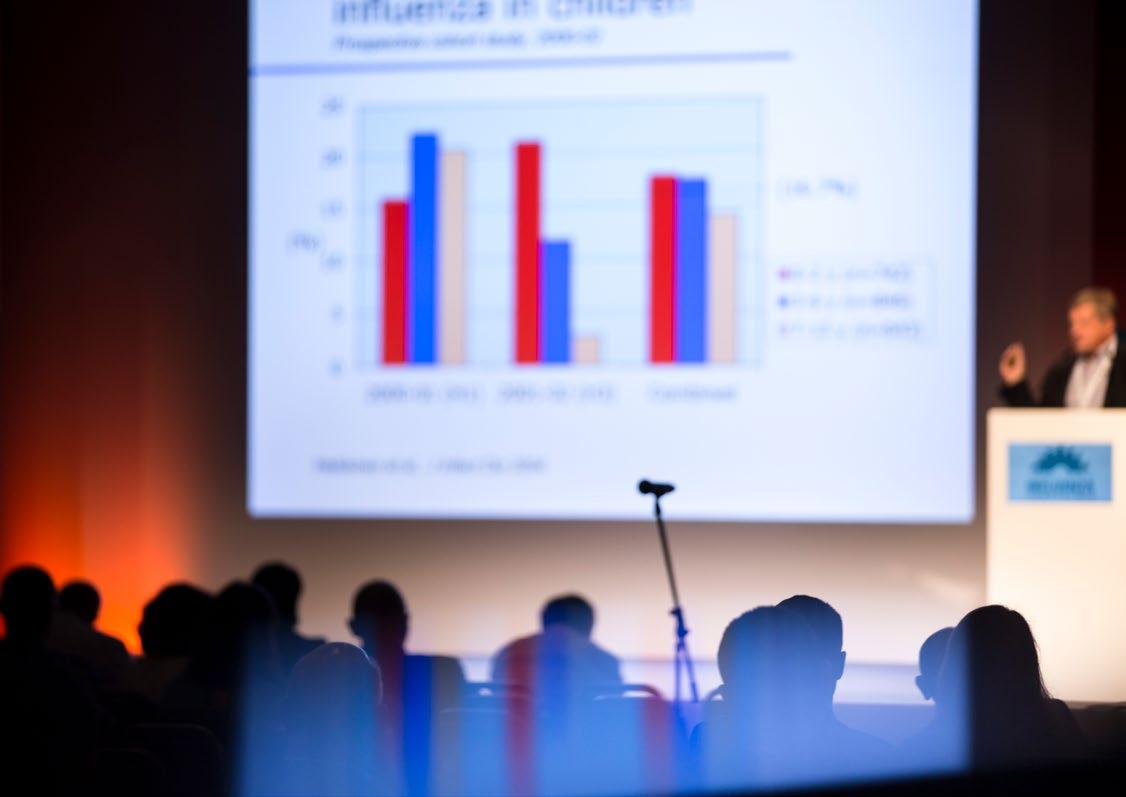
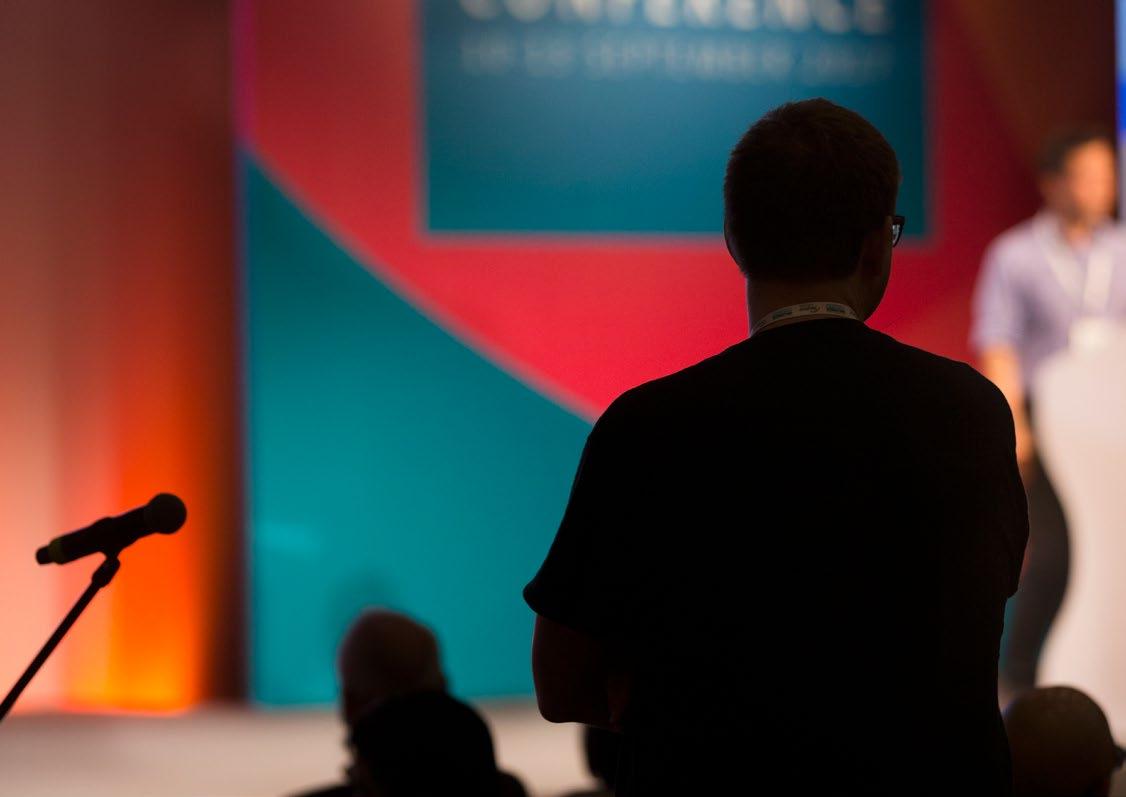



The European Scientific Working group on Influenza (ESWI) is a group of key scientific experts in influenza who have joined forces in the aim to reduce the burden of influenza in Europe:
Ted van Essen, Amersfoort, The Netherlands
Gülsah Gabriel, Heinrich-Pette-Institute, Leibniz Institute for Experimental Virology in Hamburg, Germany
Terho Heikkinen, University of Turku, Finland
Susanne Herold, University of Giessen Lung Centre, Germany
Edward C. Hutchinson, University of Glasgow, UK
Laurence Josset, University of Lyon, France
Peter Openshaw, Imperial College London, UK
Ab Osterhaus, Research Center for Emerging Infections and Zoonoses Hannover, Germany
Roman Prymula, Military Hospital of Hradec Kralove, Czech Republic
Sylvie van der Werf, Institut Pasteur, Paris, France
Marco Goeijenbier, Harbour Hospital Rotterdam, The Netherlands
realize its objective,
has established
partnerships with influenza stakeholder organizations:

People with diabetes face a higher risk for influenza and its complications. National and international guidelines therefore advise that diabetes patients be annually vaccinated against influenza.
The evidence that underpins these guidelines has long been fragmented and underexposed. Consequently, attention for the impact of influenza on diabetes patients is low and so is the influenza vaccine uptake in this group, despite WHO’s target to routinely vaccinate 75% of all people at high risk. It was therefore high time to assemble all currently available data about the impact of influenza on diabetes patients and to review current influenza prevention strategies. ESWI has undertaken this important endeavour and in its most recent paper (published in Vaccine Journal on 12 September 2017), ESWI has reviewed the scientific base for recommending routine vaccination of diabetes patients against influenza.



No less than 19 young scientists had entered the 4th ESWI Best Body of Work Award competition
The scientific quality of the submissions was of an exceptionally high level. The Evaluation Committee members fully agreed that it was a great pleasure to see so many talented young flu researchers and to review their work. But it also made their task to assess the applications a complex and difficult one. After thorough deliberation, the Evaluation Committee members decided to award the fourth edition of ESWI’s prize to Dr. Debby van Riel, Erasmus MC Rotterdam, The Netherlands. She received a cash award of €10,000 and an invitation to present at the Sixth ESWI Influenza Conference in Riga.
In light of the quality of their work, several other applicants had been invited to co-chair a scientific session at the 2017 Riga Conference, as indeed, appointing promising scientists as programme session co-chairs is also part of ESWI’s objective to stimulate the careers of promising researchers.
 ESWI’s founding father Claude Hannoun celebrates the 2017 Best Body of Work Award Winner Debby van Riel during the 6th ESWI Influenza Conference.
ESWI’s founding father Claude Hannoun celebrates the 2017 Best Body of Work Award Winner Debby van Riel during the 6th ESWI Influenza Conference.
ESWI has been working with WONCA Europe (the European branch of the world organization of national colleges and academies of general practitioners) since 2009. Both organizations share the objective to improve the management of influenza by general practitioners during seasonal and pandemic outbreaks of flu. This is urgently needed to solve the paradox where primary care physicians play a crucial role in protecting their patients from influenza infection by providing clear, scientific advice about the benefits of influenza vaccination for at-risk groups. But despite the scientific evidence as well as the efforts to encourage influenza vaccination, the overall vaccination rates among risk groups and healthcare workers remain low.
A systematic overview of all aspects of influenza from the family physicians’ perspective is hence urgently needed and that is exactly why EUROPREV, a WONCA Special Interest Group dedicated to prevention and health promotion, and ESWI joined forces at the occasion of the WONCA 2017 conference in Prague (28 June 1 July 2017). ESWI and EUROPREV held a joint symposium on 29 June 2017, gathering experts from various disciplines to discuss the crucial role of care physicians in influenza vaccination and to provide an overview of scientific arguments for primary care physicians to get the annual flu vaccine. The symposium was chaired by EUROPREV’s Mateja Bulc and ESWI’s Ted van Essen. The outcome of the meeting will be the basis of a joint statement on the crucial role of care physicians in influenza vaccination.
Representatives of ESWI, APACI, the US National Adult and Influenza Immunization Summit and ISIRV held a Global Influenza Summit Planning Meeting on 11 September 2017 in Riga. The partners agreed on the concept of a 2-day meeting with pandemic preparedness as the theme, to commemorate the outbreak of 1918 Spanish flu, while looking at how to improve on past pandemic experiences.
The end result of the meeting is agreed to be the publication of a road map, listing the steps required to be appropriately prepared for the next influenza pandemic. The Global Influenza Summit will be held in China in November 2018. Discussions are currently ongoing to finalize the programme and the location.



ESWI in close collaboration with the European Society for Paediatric Infectious Diseases (ESPID) held its scientific symposium on Influenza Preventing Policies for Children on 14 June 2017 at the Faculty Club of the University of Leuven, Belgium. Participants from 25 countries across the world, including scientists, virologists, paediatricians, family doctors, public health officials and policy makers and the private sector, came together to share the latest scientific findings on child vaccination and vaccine efficacy in children and discuss approaches and best practices.
The main objectives of this symposium were to pave the way towards well-balanced influenza preventing policies for children in Europe and to create awareness and attention for childhood flu vaccination as a priority topic on the public health policy agenda.
Creating a common approach takes time and the symposium should hence be seen as the starting point of a trajectory that will continue to fuel the scientific/policy debate. In the months following the symposium, this trajectory has led to Riga, where the symposium outcome fed into the programme of the Sixth ESWI Influenza Conference, and to Malmö, where ESPID and ESWI will hold a joint symposium on flu vaccination of children at the 36th annual ESPID Congress (30 May 2018).
The easy-to-grasp report of this scientific symposium

on the ESWI portal website:
Symposium lectures have been videorecorded.
recordings are available on ESWI TV at
On 25 October 2017, the diabetes community joined forces to pave the way towards an improved protection of diabetes patients. In fact, patient organizations, healthcare professionals and academic experts assembled in Leuven, Belgium, for a roundtable discussion organized by the Foundation of European Nurses in Diabetes (FEND) and ESWI.
The roundtable discussions were extremely relevant as influenza vaccine uptake in diabetes patients is low, despite WHO’s target to routinely vaccinate 75% of all people at high risk. Estimations from recent years indicate vaccination rates for diabetes patients between 50% and 62% in the US, but only 10% in Poland and 40% in Germany.
ESWI’s roundtable on influenza vaccination of people with diabetes enjoyed the active participation of:
■ Foundation of European Nurses in Diabetes (FEND
■ Primary Care Diabetes Europe (PCDE)

■ The International Society for Pediatric and Adolescent Diabetes (ISPAD)
■ Immunology of Diabetes Society (IDS)
■ Pharmacist Group to the European Union (PGEU)
■ The International Diabetes Federation (IDF Europe)
To enhance participation of the worldwide diabetes community, the morning lectures had been made accessible via livestream. 116 viewers from Australia to the USA watched the lectures and were able to participate in the discussions via chatbox. The entire roundtable event (including the panel discussion) had been videotaped. The edited videos are available on the ESWI website (ESWI TV section).
The main take home messages of this important event have now been summarized in this easy-to-grasp fact sheet.
The flu is a contagious disease that infects the nose, throat, and sometimes the lungs.
Every year, 5% to 15% of the global population catches influenza. Worldwide, these annual outbreaks cause about 250,000 to 500,000 deaths.
Anyone can get the flu, and serious problems related to the flu can happen at any age. But some people are at high risk of developing serious complications: people 65 years and older, people of any age with certain chronic medical conditions (such as asthma, diabetes, or heart disease), pregnant women, and young children.
Influenza vaccines are safe and effective tools to protect from influenza infection and its complications.
Type diabetes is caused by the body’s immune system attacking the insulin producing cells in the pancreas. The body no longer produces insulin and glucose levels rise. Treatment with insulin injections is always required for survival.
In type diabetes, the pancreas still often produces some insulin but either not enough or it is not used properly by the various organs in the body.
Diabetes patients are a particularly heterogeneous patient group.
Worldwide, about 415 million individuals suffer from diabetes, with type 2 diabetes accounting for up to 95% of all cases.
46.3% of people with diabetes are undiagnosed.
New predictions anticipate that the number of patients with diabetes will reach almost 642 million by 2040.
Raising awareness among diabetes patients and increasing fl vaccination coverage is responsibility shared by many parties. On 25 October 2017, the diabetes community decided to join forces and to pave the way towards an improved protection of diabetes patients. In fact, patient organizations, healthcare professionals and academic experts assembled in Leuven, Belgium, for a roundtable discussion organized by the Foundation of European Nurses in Diabetes (FEND) and the European Scientifi Working group on Influenza (ESWI). The following organizations participated in the discussions:
A dangerous complication of the flu is pneumonia and people with diabetes are more at risk of developing this complication than people without diabetes. Flu, and other viral infections, can lead to higher blood sugar levels.
People with diabetes are six times more likely to be hospitalized with influenza during fl outbreaks.
Diabetes guidelines issued by the World Health Organization (WHO), the American Diabetes Association (ADA) and the European Association for the Study of Diabetes (EASD) recommend diabetes patients to get their fl vaccine at the start of every flu season.
A recently published review study confirms that vaccinating people with diabetes against influenza is indeed the sensible thing to do (Vaccine Journal, 12 September 2017) But people with diabetes seem to be unaware of the potential risk of an influenza infection. In Germany, only 40%
Roundtable highlights and conclusions
Primary
Research
All
All
A
High
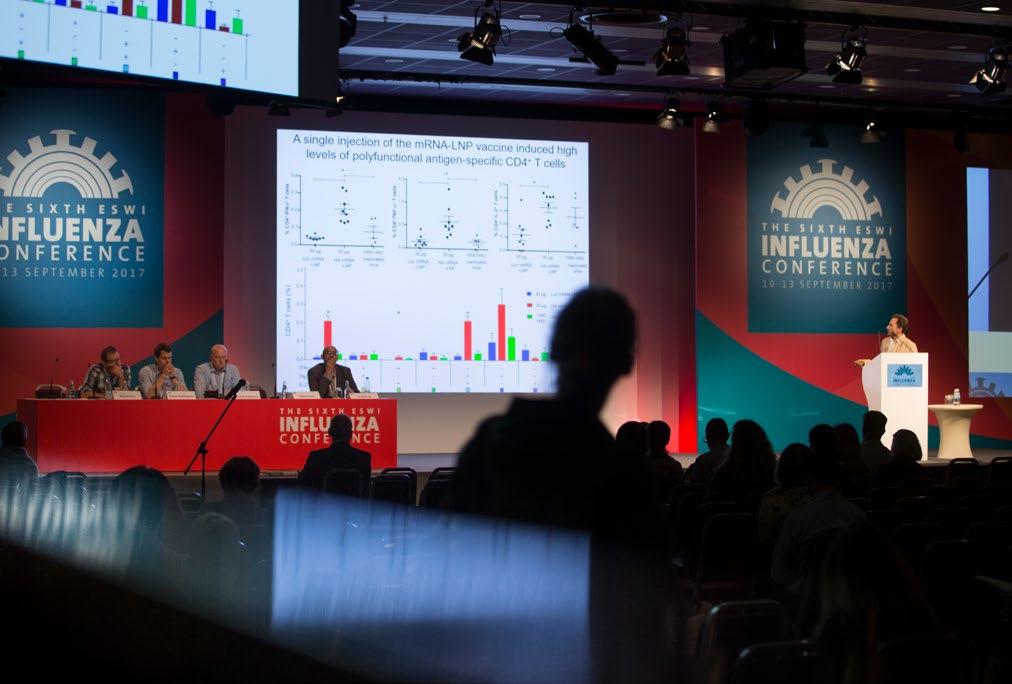
From 10 13 September 2017, the Sixth ESWI Influenza Conference assembled 712 members of the worldwide influenza community in Riga, Latvia. The conference gave the floor to the most renowned scientific experts of the world in order to showcase recent advances in basic science and the control and prevention of influenza, to stimulate the scientific debate on novel, unpublished research data and to advance our understanding of influenza by identifying new research routes.

This was exemplified by the choice of keynote speakers, which included Prof. Peter Palese who addressed the issue of a universal influenza virus vaccine, and Prof. Malik Peiris, who elaborated on the potential threats posed by H5, H7 influenza viruses. Another example is ESWI’s aim to address urgent scientific and social challenges. To that end, a separate scientific session was dedicated to the issue


of maternal influenza vaccination. Yet another urgent social need is the risk management and mitigation of epidemic and pandemic threats. In this context, ESWI cooperated with the World Health Organization, where Marie-Paule Kieny organized a session on this particular topic.
The Sixth ESWI Influenza Conference again had two separate programme tracks. The scientific programme showcased the latest scientific achievements in the full spectrum of influenza research from basic to translational science. In keeping with ESWI’s aims to foster the exchange of evidence and practice at the interface of science and health policy, the conference also saw a new edition of the Science Policy Interface (SPI), the separate programme track specifically dedicated to public health officials, which ‘translated’ the newest scientific data into daily policy practice.
Top experts brought a mixture of tailor-made lectures, good practices, case studies and workshops. In seven sessions, they answered questions like: What is the potential impact of the H5N1, H7N9 and H5N8 bird flu viruses in Europe? What can we learn from other disease outbreaks like Zika, MERS and Ebola? Is the influenza vaccine safe for pregnant women? Can and will flu vaccines be improved? Will there ever be a vaccine that protects against all types of flu virus? And what is the future of antiviral flu drugs? The session topics had been arranged in such a way as to maximize the opportunities for interdisciplinary interactions.
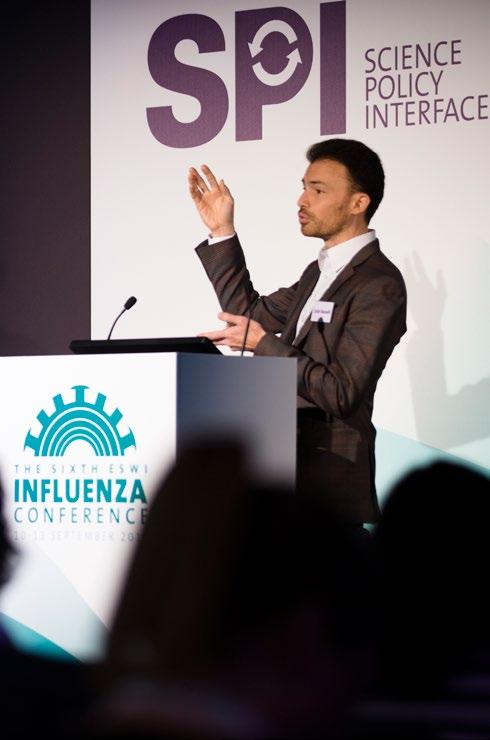
Another unique feature of the ESWI Influenza Conferences is their strategy to support young, promising scientists from around the world. Through the Young Scientist Fund, ESWI provided 56 grants to young researchers. Successful grant applicants played an active role in the conference, each presenting their research either orally or in poster format. In addition, young scientists acted as co-chairs during the conference sessions, assisting the session chairs (renowned influenza experts) in selecting oral and poster presentations and in moderating the scientific debate during the conference. Importantly, Wednesday 13 September 2017 opened with a plenary session entirely devoted to the work of promising young scientists. Traditionally, these plenary sessions are highly appreciated in the influenza community, mainly due to their innovative and refreshing nature.



Conference participants came from 72 different countries. The overall majority of participants are Europeans (66%), with an important delegation from the US (15% of the conference participants). The vast majority (63%) of attendees are academics with an interest in influenza research (virology, epidemiology, vaccinology, diagnostics, animal health, mathematic modelling, immunology, public health science, family medicine...), 19% are public health officials (mainly representatives of the various national public health authorities), 15% are young, promising scientists who receive an ESWI scholarship, 2% are conference staff and commercial exhibitors, and 1% are members of the press.

ESWI is well-placed to assist international research consortia in bringing their findings to the heart of the society, emphasizing the importance of their work for the benefit of the people. ESWI is hence a partner in the communication & dissemination work packages of two major EU funded research projects:

FLUNIVAC (InFLUenza virus UNIVersal VACcine development program) is a unique consortium of various European SMEs, universities and an industry partner, which aims to pave the way to the development of a universal influenza vaccine. ESWI develops, edits and disseminates the annual FLUNIVAC newsletter to its list of influenza stakeholders.
PREPARE (Platform for European Preparedness Against (Re-)emerging Epidemics) is an EU funded network for harmonized large-scale clinical research studies on infectious diseases, prepared to rapidly respond to any severe ID outbreak, providing real-time evidence for clinical management of patients and for informing public health responses. ESWI contributed to the creation of a Virtual Learning Centre as a separate platform and domain. In 2017, ESWI had allocated a prominent slot for the PREPARE satellite symposium at the 6th ESWI Influenza Conference. In fact, PREPARE opened the conference with its scientific contribution on Sunday 10 September 2017.
OVER THE PAST YEARS, THE FLUNIVAC CONSORTIUM HAS BEEN PARTICULARLY SUCCESSFUL IN THREE MAJOR AREAS. THE FIRST AREA IS THE IDENTIFICATION AND OPTIMIZATION OF INFLUENZA ANTIGENS FOR INDUCING BROADER LEVELS OF INFLUENZA-SPECIFIC IMMUNITY, THE SECOND AREA RELATES TO THE REGULATION OF MVA GENE EXPRESSION, WHICH OPENS THE PATHWAY FOR OPTIMIZED USE IN THE FUTURE. AND THIRDLY, THE FLUNIVAC PARTNERS HAVE DEVELOPED NEW WAYS TO INFLUENCE THE MVA INDUCED ANTIGEN SPECIFIC IMMUNITY, WHICH IS IMPORTANT FOR BOTH T-CELL IMMUNITY AND ANTIBODY IMMUNITY.
FLUNIVAC consortium partners in Rotterdam, Ghent and Munich focused their collaborative research mainly on three specifi virus antigens: the nuclear protein (in the aim to induce broader levels of T-cell mediated immunity against influenza), and two antibody antigens (M2e and neuraminidase). M2e is a very short membrane associated antigen of influenza A virus, and interestingly, it is based on a highly conserved amino acid sequence that allows to induce antibody responses to influenza A viruses that are cross-reactive with many strains from different subtypes.
One of the challenges associated with the shortness of M2e, however, is to optimize its presentation to the immune system.
By engineering a fusion protein with an MVA encoded glycoprotein, the FLUNIVAC partners have found a possible solution to this challenge. The glycoprotein has been modified
to carry three copies of the M2e antigen in its head domain, which allows to expose the M2e antigen more prominently, leading to enhanced antibody response.
Interestingly, experiments in mouse models have demonstrated that vaccination with this MVA-A56-M2e indeed protects against infection with influenza A virus. This leads to the conclusion that M2e should definitely be maintained as a highly promising candidate antigen for the development of a “universal” influenza vaccine.
Pursuing another promising research route, the FLUNIVAC partners have confirmed the nuclear protein as a very important T cell antigen, which by itself can already provide considerable levels of protection. The FLUNIVAC researchers also demonstrated that modifying this antigen – in specific ways that have been identified within the FLUNIVAC project – may enhance the T cell immunogenicity.
THE QUEST FOR A UNIVERSAL INFLUENZA VACCINE
FLUNIVAC (InFLUenza virus UNIVersal VACcine development program) is a unique consortium of various European SMEs, universities and an industry partner, which is supported by the European Commission’s Seventh Framework Program. FLUNIVAC’s aim is to pave the way to the development of a universal influenza vaccine.

Influenza viruses have a great capacity to mutate and change. Current flu vaccines are safe and effective, but they have to be updated annually to match the epidemic strains and occasionally there is a mismatch with the circulating virus strains. There is hence a great need for new vaccines that can induce broad immunity ideally against all manifestations of influenza in humans (seasonal, zoonotic and pandemic).
A crucial element in FLUNIVAC’s research is a vaccine delivery platform based on MVA (Modified Vaccinia virus Ankara). This replication defi cient vaccinia-derived virus is unable to form new infectious particles in humans and thus is very safe to use. It allows the construction of recombinant MVAs that express influenza virus proteins in a way that favours recognition by our immune system.
ESWI continues to create, collect and disseminate relevant scientific content about influenza with three important objectives:
■ to reinforce ESWI’s reputation and increase “brand” awareness
■ to increase interaction with target audiences
■ to promote ESWI events and increase the number of attendees

Visitors of the www.eswi.org portal website can browse through our videos on various influenza topics in ESWI TV, get the information they need from our influenza knowledge center, stay informed about ESWI’s triennial influenza conferences, its symposia and roundtables, and the yearly Influenza Summits.
ESWI is determined to expand and update the content on the portal in order to maintain relevance and authority.
ESWI manages and constantly updates a database of some 7,200 influenza stakeholders worldwide. ESWI is ready to use this platform in any flurelated educational project, as it is a highly flexible tool to reach the global flu field in just a few clicks. Another tool in ESWI’s web-based communication strategy is its monthly newsletter. The ESWI News Bulletin offers a selection of influenza-related articles collected from a range of media sources. The Bulletin is hence a cost-effective way to enhance ESWI’s visibility in the influenza community.
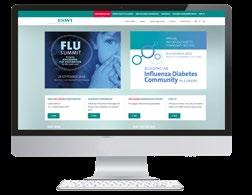
2018 will again be an interesting, busy and fascinating year for ESWI. To realize its aims, however, ESWI fully relies on the loyal and active support of its members, partner organizations and sponsoring companies. Their joint forces are the strength of ESWI, allowing the organization to play its unique role in the influenza field.

If you have any questions about the European Scientific Working group on Influenza, please contact:
David De PooterESWI management e-mail: david.depooter@eswi.org